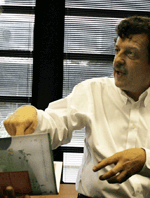Accountability and access to information shouldn't be luxuries just for rich countries
Published on Tue, 2011-07-12 14:35
Source:InterAksion, news portal of TV5: The principles of accountability are universal and “the ‘naming and shaming’ mechanisms are essentially the same", but the means for attaining those principals vary from country to country, said Roberto Bissio, Social Watch coordinator, on Tuesday, the first day of the network's Global Assembly that is taking place in Manila, Philippines. Bissio explained, in short, that when "a situation of injustice or rights violation is detected, information is gathered, a demand is articulated, solutions are proposed and the authorities are engaged to solve the problem or remove the obstacles." "The Social Watch network amplifies these demands and through its reporting mechanisms provides a tool for groups to improve their capacities. One such mechanism is the development of rights-based indices,” Bissio remarked , who is also executive director of the Third World Institute (ITeM).. Access to information laws (FOI acts) are other mechanisms to be used by civil society organizations. They are not just luxuries of rich countries, according to Bissio, who noted that apart from Sweden, a rich, developed country where the first one was passed in 1766, “they are also working in India and Mexico.” At least 85 countries have this kind of law, and “people of other countries will greatly benefit from it," Bissio said. Leonor Briones, Social Watch Philippines Lead Convenor, said a FOI act will not only increase transparency and accountability in her country, but also help ordinary citizens join debates on corruption and other accountability issues. According to Briones, citizens need to be able to invoke freedom of information in obtaining State documents so they can be subjected to expert analysis. "The FOI (Acts) can be a very important tool in the fight against corruption. We are not only talking about corruption here in terms of stealing, in terms of getting money that deprive people of services, but we're talking of corruption of political systems, of ideas, of what democracy is all about,” she added. Social Watch Philippines is hosting the current Social Watch Global Assembly, called "Claiming Democracy: Accountability for Social and Economic Justice". Bissio said the basic mandate of Social Watch to promote government accountability has remained the same over time. "In far too many places, the accountability process is made difficult or insufficient by different limitations to the basic rights: the right of citizens to voice their opinions, the right to assemble, and the right to access government information," said Bissio. US activist Tanya Dawkins, Co-Chairperson of Social Watch Coordinating Committee, lamented the lack of urgency and creativity with regard to resolving people’s issues of poverty and inequality. Dawkins observed a “scandalous” set-up wherein governments “are quick to act and generate resources for banks drawn into the global financial crisis such that a bailout package is quickly put in place yet,” but takes its time “when dealing with people’s issues.” |
SUSCRIBE TO OUR NEWSLETTER



